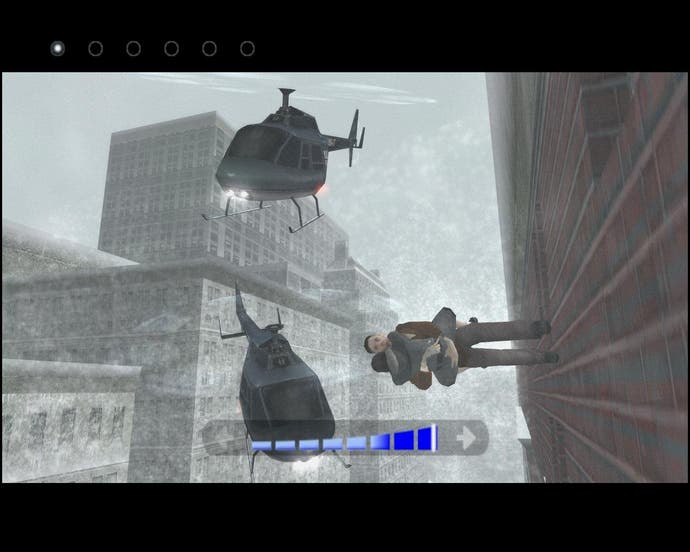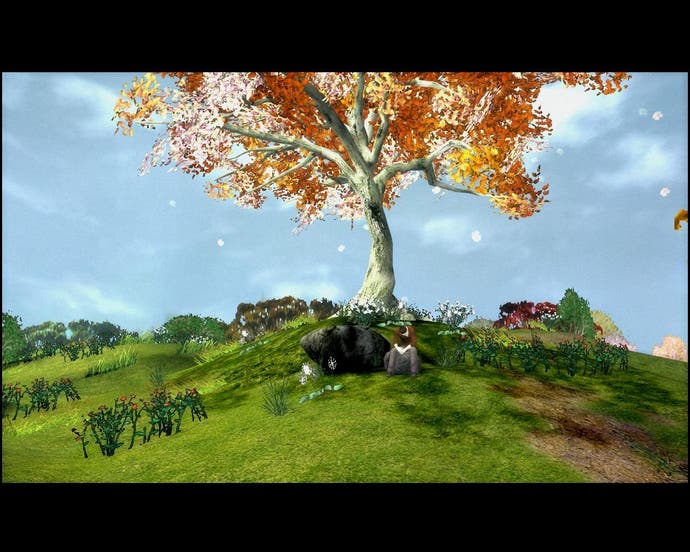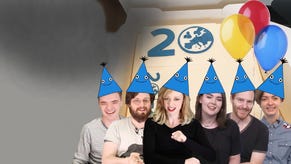Retrospective: Fahrenheit
Winter wonderland or snowballs?
This involves tiresomely avoiding the stare of guards and searchlights, with scant few checkpoints and crappy controls. But struggle through and you'll learn that Lucas saw an... oh good grief, I don't even want to type it after "Mayan Oracle" and "physical manifestation of the Internet". A... an alien artefact. There. Happy?
It's like Cage put all his ideas for game stories into a box, then on his way to his desk tripped up (presumably because he didn't press RED GREEN RED in time) and spilt the entire lot across the floor. Looking down at the resulting jumble his brain spasmed and he said, "Yes! That's it!" That wasn't it, David. That wasn't it at all.
There are other flaws. Tyler, an extremely nice guy, is perhaps not the most nuanced portrayal of a black man in a game. He likes soul music, you see, which he listens to in an apartment that looks like a tribute to a colourblind pimp's hideout. But he's good at basketball!
Carla's gay friend may as well just say, "LOOK! I'm a gay character in this game, and no one minds! See how no one is minding! Isn't it shocking that no one minds!" Um, no. He has one particularly horrible line about how hard it is for him to be gay, which he says apropos of absolutely nothing.

While the acting is great, the dialogue does paddle about in the bland end of the pool, occasionally descending to lines like, "Feels as though somebody shoved a steel bar in my brain and then melted it."
However, let's look at what has been taken and run with: the conversations. It's only now, five years later, that games are noticing what a splendid idea Cage had.
When chatting with people a series of options appear, each represented by a single word. You have barely a few seconds to pick one of them (using a mouse gesture, as so much of the interaction does), and often times picking one will mean you never get to hear about the other two or three.
It makes the conversations feel real, alive, and lively. You can't just sit back and watch the scenes play out, nor click through the list of all the dialogue options, as is most commonly the case. You have to be alert, involved, and sacrificing one area of knowledge to gain another. Alpha Protocol is the most obvious recent adopter of this, with Mass Effect 2 employing some of it for its own dialogue.
It's also a game that understands mise-en-scène. There's a subplot that's pretty much unexplained about the world getting colder. But this begins with simple winter, with reports of heavy snowfall to come. It gives the game a colour and a tone, and emphasises the path Lucas, Carla et al are on.

The further you get, the more colourless the world becomes, washed out whites and greys dominating. Should you manage the "happy" ending, then for the first time vivid greens appear in an Eden-like scene.
What's disappointingly not been well adopted since Fahrenheit is the use of split-screen. Of course 24 had been on TV for a few years before the game came out, but neither seems to have inspired many others to use it as an effective narrative device, not only allowing you to see multiple perspectives, but also developing tension in situation of pursuit.
I like to remember Fahrenheit/Indigo Prophecy (let's ask the obvious question yet again: why was the game name changed for the country that still uses Fahrenheit as its measure of temperature?) as a game in which you can put dirty clothes in the washing machine, rather than one where you outrun helicopters after stealing a girl from an orphanage in order to prevent the internet or the Mayans from taking over the world while somehow having your pursuing cop fall in love with you without having met you.
I like to remember it for its remarkable use of motion capture, making the characters move in stunningly realistic ways, rather than for how Tyler has freakish arms that are wider and longer than his legs.
If only someone else had been in a position to edit the story, to point out that perhaps it didn't need to be about ancient curses, alien devices, and the bloody internet turning into an old lady/robot. It was doing rather well as a mysterious possession/murder story.
I like to remember it for being absolutely bursting with ideas, whether they work or not. I love that David Cage was bold enough to make this game, and willing to push things farther than perhaps works. It's how you find the limits.










